Given: Two parallel lines are cut by a transversal and m∠4=75°.
What is the m∠5? Justify your answer.
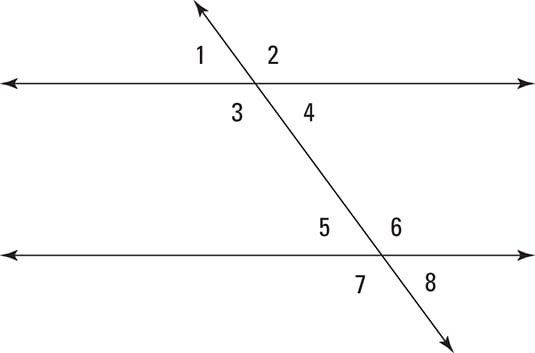
75° because they are alternate interior angles.
Fill in the blanks:
The sum of the measures of the interior angles of a triangle is _______.
The measure of an _________ ________ of a triangle is equal to the sum of the measures of the two remote (non-adjacent) interior angles.
180°, exterior angle
Do the lengths 5 m, 12 m, and 13 m form a triangle? If so, is it a right triangle?
Yes a triangle and yes a right triangle
(5, 12, 13 is a Pythagorean Triple!)
Find the missing side length. If necessary, find the length to the nearest tenth.
8 cm
(8, 15, 17 is a Pythagorean Triple!)
Is the number below rational or irrational? Justify your answer.
Rational because it is a ratio of two integers and a repeating decimal.
Describe the association of the data in the scatterplot below. Include strength, direction, form, and if there are any outliers.
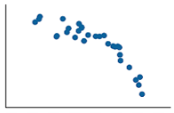
Strong/moderate negative nonlinear association with no outliers
Given: Two parallel lines are cut by a transversal and m∠2 = 100°.
What is the m∠4? Justify your answer.

80° because they are adjacent supplementary angles.
Write an equation to find the measure of ∠C. Then find the measure of ∠C.
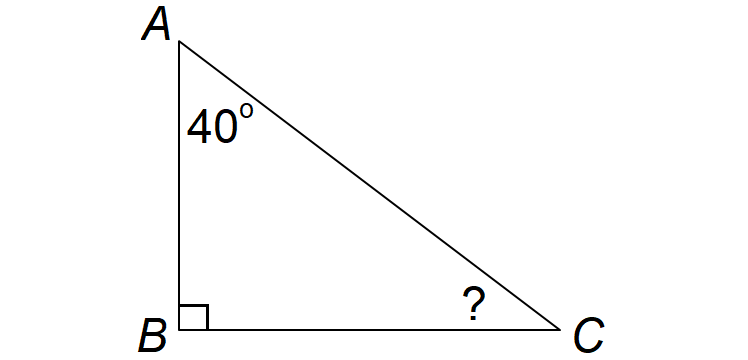
x + 90 + 40 = 180
50°
Do the lengths 4 cm, 9 cm, and 11 cm form a triangle? If so, is it a right triangle?
Yes a triangle (3 true statements satisfying the Triangle Inequality Theorem)
Not a right triangle (does not make Pythagorean Theorem true)
Find the missing side length. If necessary, find the length to the nearest tenth.
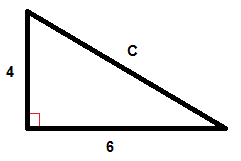
Approximately 7.2 units
Is the number below rational or irrational? Justify your answer.

Irrational because you are taking the square root of a non-perfect square and will get a non-terminating, non-repeating decimal.
Solve the system of equations below. If there is one solution, write it as an ordered pair.

(3, 2)
Given: Two parallel lines are cut by a transversal and m∠1 is 80°
What is the m∠5? Justify your answer. 
80° because they are corresponding angles.
Write an equation to find the measure of ∠C. Then find the measure of ∠C.

x + 120 + 28 = 180
32°
Do the lengths 5 cm, 6 cm, and 7 cm form a triangle? If so, is it a right triangle?
Yes a triangle (3 true statements satisfying the Triangle Inequality Theorem)
Not a right triangle (does not make Pythagorean Theorem true)
Find the missing side length in the right triangle below. If necessary, find the length to the nearest tenth.
Approximately 6.9 cm
Approximate the number below to the nearest whole number.

approximately 4
Identify the relationship in each table as linear or nonlinear. Justify your answer.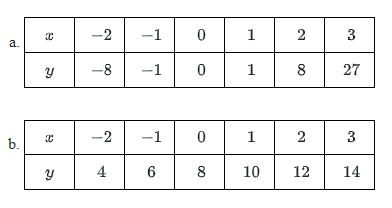
a) nonlinear; not a constant rate of change (growth rate)
b) linear; constant rate of change (as x increases by 1, y increases by 2)
Given: Two parallel lines are cut by a transversal and m∠3 = 125°
What is m∠5? Justify your answer.

55° because they are same-side interior angles.
Given: m∠1 is 70° and m∠2 is 40°
Write an equation to find the measure of angle 4. Then find the measure of angle 4.
70 + 40 = x
110°
Do the lengths 6 in., 8 in., and 10 in. form a triangle? If so, is it a right triangle?
Yes a triangle and Yes a right triangle
(6, 8, 10 is a Pythagorean Triple!)
Bryan lives 6 miles south of the movie theater and 8 miles east of his cousin. What is the distance, in miles, between his cousin's house and the movie theater? If necessary, write the distance to the nearest tenth.
10 miles
(6, 8, 10 is a Pythagorean Triple!)
Approximate the number below to the nearest tenth.
approximately 8.7
John is blowing up balloons for a birthday party. He has already blown up 15 balloons and can blow up 3 balloons every 2 minutes. Write an equation to represent the situation. Then identify the slope and the y-intercept.

slope = 3/2
y-intercept = 15
Given: Two parallel lines are cut by a transversal and m∠ 7= 110°
What is m∠ 6? Justify your answer.
110° because they are vertical angles.
Given: m∠1 is 55° and m∠4 is 120°
Write an equation to find the measure of angle 2. Then find the measure of angle 2.
120 = 55 + x
65°
Do the lengths 8 cm, 10 cm, and 18 cm form a triangle? If so, is it a right triangle?
Not a triangle
(8 + 10 is NOT greater than 18)
Find the distance between (-2, -2) and (4, 3). If necessary, write the distance to the nearest tenth.
approximately 7.8 units
Order the numbers below from least to greatest.


Simplify the expression below.

